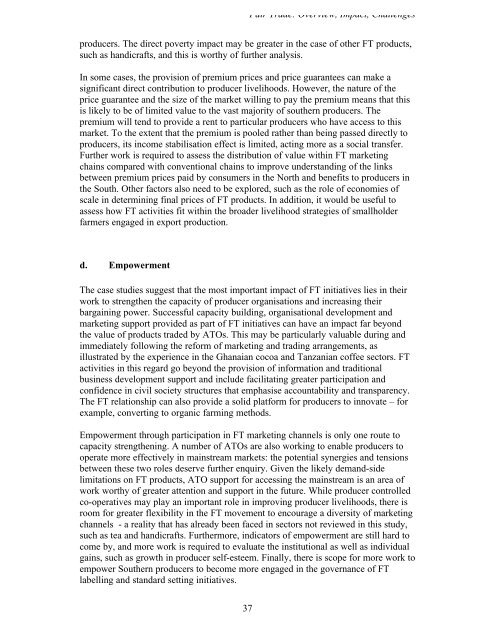Fair Trade: Overview, Impact, Challenges - Are you looking for one ...
Fair Trade: Overview, Impact, Challenges - Are you looking for one ...
Fair Trade: Overview, Impact, Challenges - Are you looking for one ...
Create successful ePaper yourself
Turn your PDF publications into a flip-book with our unique Google optimized e-Paper software.
37<br />
<strong>Fair</strong> <strong>Trade</strong>: <strong>Overview</strong>, <strong>Impact</strong>, <strong>Challenges</strong><br />
producers. The direct poverty impact may be greater in the case of other FT products,<br />
such as handicrafts, and this is worthy of further analysis.<br />
In some cases, the provision of premium prices and price guarantees can make a<br />
significant direct contribution to producer livelihoods. However, the nature of the<br />
price guarantee and the size of the market willing to pay the premium means that this<br />
is likely to be of limited value to the vast majority of southern producers. The<br />
premium will tend to provide a rent to particular producers who have access to this<br />
market. To the extent that the premium is pooled rather than being passed directly to<br />
producers, its income stabilisation effect is limited, acting more as a social transfer.<br />
Further work is required to assess the distribution of value within FT marketing<br />
chains compared with conventional chains to improve understanding of the links<br />
between premium prices paid by consumers in the North and benefits to producers in<br />
the South. Other factors also need to be explored, such as the role of economies of<br />
scale in determining final prices of FT products. In addition, it would be useful to<br />
assess how FT activities fit within the broader livelihood strategies of smallholder<br />
farmers engaged in export production.<br />
d. Empowerment<br />
The case studies suggest that the most important impact of FT initiatives lies in their<br />
work to strengthen the capacity of producer organisations and increasing their<br />
bargaining power. Successful capacity building, organisational development and<br />
marketing support provided as part of FT initiatives can have an impact far beyond<br />
the value of products traded by ATOs. This may be particularly valuable during and<br />
immediately following the re<strong>for</strong>m of marketing and trading arrangements, as<br />
illustrated by the experience in the Ghanaian cocoa and Tanzanian coffee sectors. FT<br />
activities in this regard go beyond the provision of in<strong>for</strong>mation and traditional<br />
business development support and include facilitating greater participation and<br />
confidence in civil society structures that emphasise accountability and transparency.<br />
The FT relationship can also provide a solid plat<strong>for</strong>m <strong>for</strong> producers to innovate – <strong>for</strong><br />
example, converting to organic farming methods.<br />
Empowerment through participation in FT marketing channels is only <strong>one</strong> route to<br />
capacity strengthening. A number of ATOs are also working to enable producers to<br />
operate more effectively in mainstream markets: the potential synergies and tensions<br />
between these two roles deserve further enquiry. Given the likely demand-side<br />
limitations on FT products, ATO support <strong>for</strong> accessing the mainstream is an area of<br />
work worthy of greater attention and support in the future. While producer controlled<br />
co-operatives may play an important role in improving producer livelihoods, there is<br />
room <strong>for</strong> greater flexibility in the FT movement to encourage a diversity of marketing<br />
channels - a reality that has already been faced in sectors not reviewed in this study,<br />
such as tea and handicrafts. Furthermore, indicators of empowerment are still hard to<br />
come by, and more work is required to evaluate the institutional as well as individual<br />
gains, such as growth in producer self-esteem. Finally, there is scope <strong>for</strong> more work to<br />
empower Southern producers to become more engaged in the governance of FT<br />
labelling and standard setting initiatives.
















![CynefinFramework final [Read-Only]](https://img.yumpu.com/19017304/1/190x135/cynefinframework-final-read-only.jpg?quality=85)